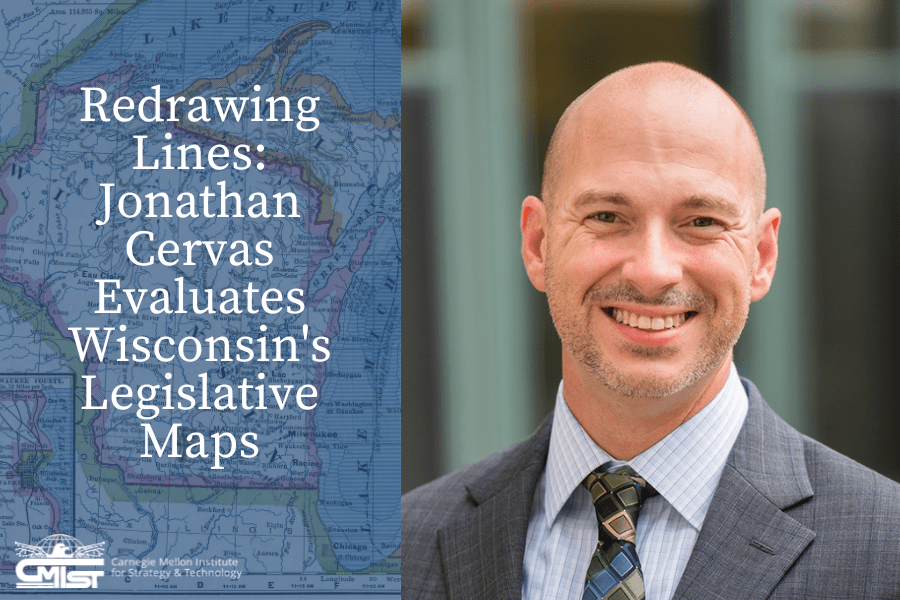
Redrawing Lines: Jonathan Cervas Evaluates Wisconsin's Legislative Maps
By Lindsay Marcellus
Redrawing electoral maps is a fraught task with high political stakes. Given the near-impossibility of satisfying both political parties, coupled with the frequently conflicting principles of redistricting, it's unsurprising that numerous states seek the expertise of nonpartisan professionals for the process. Electoral politics expert and Carnegie Mellon Institute for Strategy and Technology faculty member Jonathan Cervas is one of those professionals, and has recently been tasked with helping shape the legislative maps for the state of Wisconsin.
In a 4-3 ruling on December 22, 2023, the Wisconsin Supreme Court court determined that the state’s current legislative maps were unconstitutional because some districts included detached territory. Separately, the court appointed two nonpartisan experts, Cervas and Bernard Grofman, of the University of California, Irvine, as consultants to help select a new map. Cervas and Grofman’s primary duty is to analyze and vet proposals for Wisconsin’s new legislative districts. If necessary, they will also suggest adjustments or propose their own map.
The new maps must be in place by March 15, in time for the 2024 elections. Due to the accelerated timeline, Cervas is currently in the process of evaluating the six proposals that were submitted by the January 12 deadline. He and Grofman must submit a report of their findings by February 1.
A specialist in Geographic Information Systems, Cervas draws on his experience with the redistricting process in five other states. Most recently, he redrew the state of New York’s 26 Congressional Districts and 63 Senate districts during his tenure as Special Master in 2022. In 2021, the Pennsylvania Legislative Reapportionment Commission appointed Cervas as the redistricting consultant, where he contributed to shaping the electoral maps for his home state. Remarkably, the map garnered a bipartisan vote, an unusual (and politically significant) feat in a politically balanced state. Furthermore, it received unanimous endorsement from the Pennsylvania Supreme Court and successfully withstood a challenge at the U.S. Supreme Court. Between 2017 and 2020, while serving as the assistant to a federal court Special Master, he also helped draw remedial maps in three redistricting cases involving minority rights in Utah, Virginia, and Georgia.
In addition to redistricting and gerrymandering, Cervas’s research includes electoral reform, election integrity, representation, voting rights, and polarization. He has published several articles on U.S. elections, the Electoral College, and gerrymandering, including a recent study of statistical fallacies in claims of election fraud, an examination of partisan bias in the 2020 presidential election, and analyses of the role of state courts in combating partisan gerrymandering (including how state supreme courts responded to redistricting challenges in the 2020s).
Since joining Carnegie Mellon University in 2020 as a postdoctoral fellow, Cervas has found that the topic of representation has become increasingly important to students. This spring, he is teaching “Representation and Voting Rights,” a course which explores the theoretical underpinnings of representation as well as how representation works in practice. Cervas recently accepted a position as Assistant Teaching Professor (Fall 2024), and is committed to helping students make connections between what they learn in the classroom and their participation in democratic processes and American political institutions. Instead of a final examination, the course culminates with a final project in which students draw electoral maps that could act as alternatives or remedies to maps enacted this decade. They must also argue for why the plan they develop represents something that is good for voters.
“Students have a desire to contribute to and enhance our democracy,” Cervas observes. “In this class they develop the skills that allow them to effect change.”
